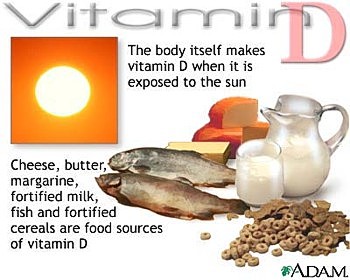Vitamin D Deficiency Linked With Growth of Uterine Fibroids, Cancers, and Neural Diseases
 September 5, 2013
September 5, 2013  Kyriaki (Sandy) Venetis
Kyriaki (Sandy) Venetis We all know that vitamin D is added to milk because it helps the body absorb and metabolize calcium for strong healthy bones, but a new study published this year from the National Institutes of Health (NIH) has also found some important information specifically for women.

NIH researchers found that, “Women who had sufficient amounts of vitamin D were 32 percent less likely to develop fibroids than women with insufficient vitamin D.”
Fibroids are non-cancerous tumors of the uterus. Fibroids often result in pain and bleeding in premenopausal women and are the leading cause of hysterectomy in the United States, according to the NIH.
Donna Baird, a researcher with the National Institute of Environmental Health Sciences (part of NIH), led the study of 1,036 women, ages 35-49, living in the Washington, D.C. area from 1996 to 1999, which completed questionnaires on sun exposure, as well as received ultrasounds to check for fibroids, and gave blood samples to check vitamin D levels.
The body can make vitamin D when skin is exposed to the sun or get it from food and supplements. The study found that, “Those who reported spending more than one hour outside per day also had a decreased risk of fibroids.”
Baird said that, “It would be wonderful if something as simple and inexpensive as getting some natural sunshine on their skin each day could help women reduce their chances of getting fibroids, but though the findings are consistent with laboratory studies, more studies in women are needed.”
Baird is currently conducting a study in Detroit to see if the findings from the Washington, D.C. study can be replicated.
Besides sunlight, among the best sources of vitamin D come from foods. The NIH finds that:
- Fatty fish such as salmon, tuna, and mackerel are among the best sources.
- Beef liver, cheese, and egg yolks provide small amounts.
- Mushrooms provide some vitamin D. In some mushrooms that are newly available in stores, the vitamin D content is being boosted by exposing these mushrooms to ultraviolet light.
- Almost all of the U.S. milk supply is fortified with 400 IU vitamin D per quart, but foods made from milk like cheese and ice cream are usually not fortified.
- Vitamin D is also added to many breakfast cereals and to some brands of orange juice, yogurt, margarine, soy beverages. Check the labels.

